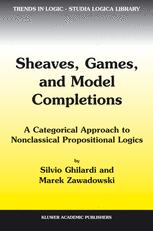

Most ebook files are in PDF format, so you can easily read them using various software such as Foxit Reader or directly on the Google Chrome browser.
Some ebook files are released by publishers in other formats such as .awz, .mobi, .epub, .fb2, etc. You may need to install specific software to read these formats on mobile/PC, such as Calibre.
Please read the tutorial at this link: https://ebookbell.com/faq
We offer FREE conversion to the popular formats you request; however, this may take some time. Therefore, right after payment, please email us, and we will try to provide the service as quickly as possible.
For some exceptional file formats or broken links (if any), please refrain from opening any disputes. Instead, email us first, and we will try to assist within a maximum of 6 hours.
EbookBell Team

4.1
20 reviewsThis book is an example of fruitful interaction between (non-classical) propo sitionallogics and (classical) model theory which was made possible due to categorical logic. Its main aim consists in investigating the existence of model completions for equational theories arising from propositional logics (such as the theory of Heyting algebras and various kinds of theories related to proposi tional modal logic ). The existence of model-completions turns out to be related to proof-theoretic facts concerning interpretability of second order propositional logic into ordinary propositional logic through the so-called 'Pitts' quantifiers' or 'bisimulation quantifiers'. On the other hand, the book develops a large number of topics concerning the categorical structure of finitely presented al gebras, with related applications to propositional logics, both standard (like Beth's theorems) and new (like effectiveness of internal equivalence relations, projectivity and definability of dual connectives such as difference). A special emphasis is put on sheaf representation, showing that much of the nice categor ical structure of finitely presented algebras is in fact only a restriction of natural structure in sheaves. Applications to the theory of classifying toposes are also covered, yielding new examples. The book has to be considered mainly as a research book, reporting recent and often completely new results in the field; we believe it can also be fruitfully used as a complementary book for graduate courses in categorical and algebraic logic, universal algebra, model theory, and non-classical logics. 1.